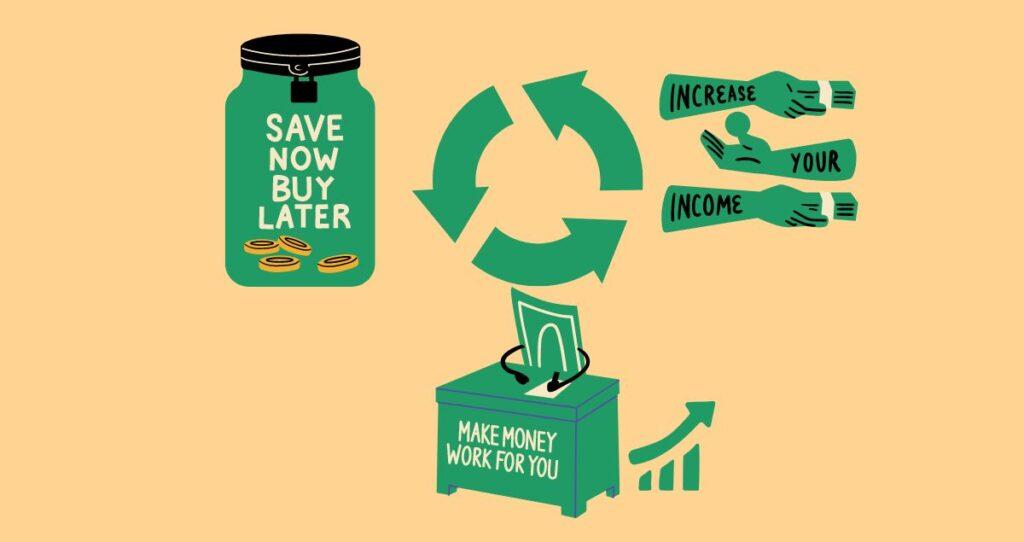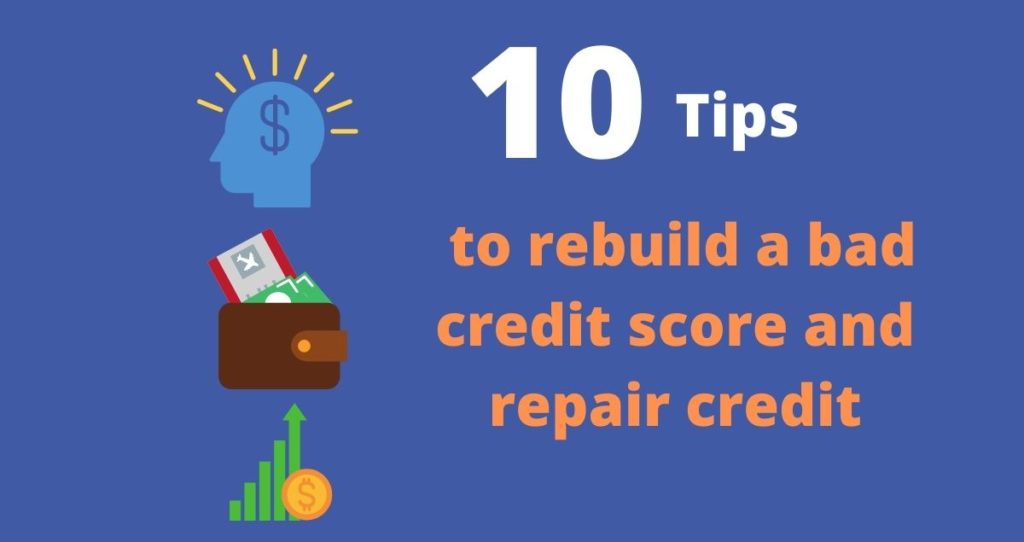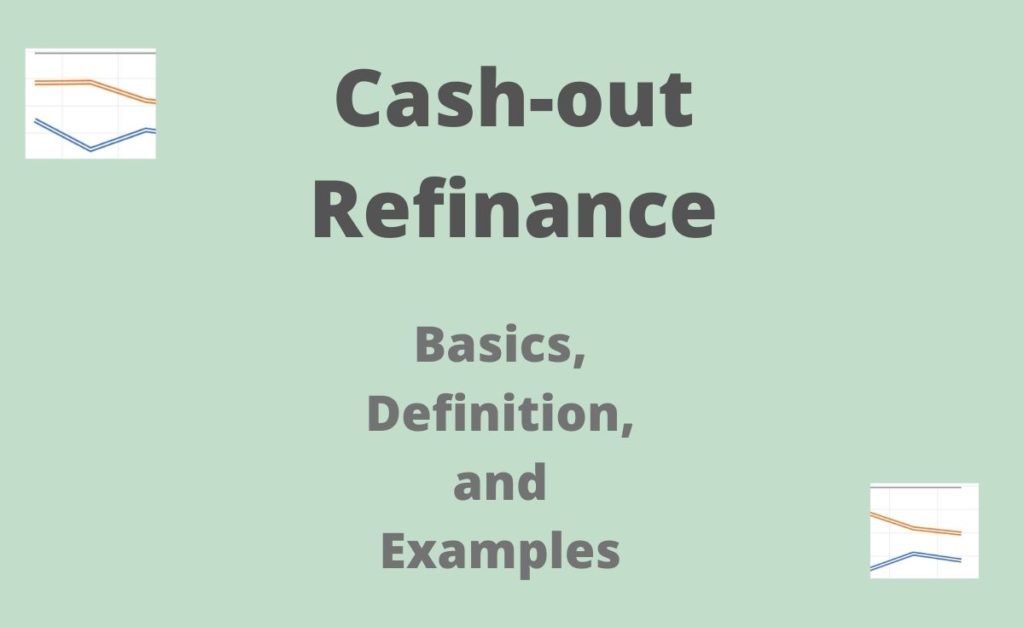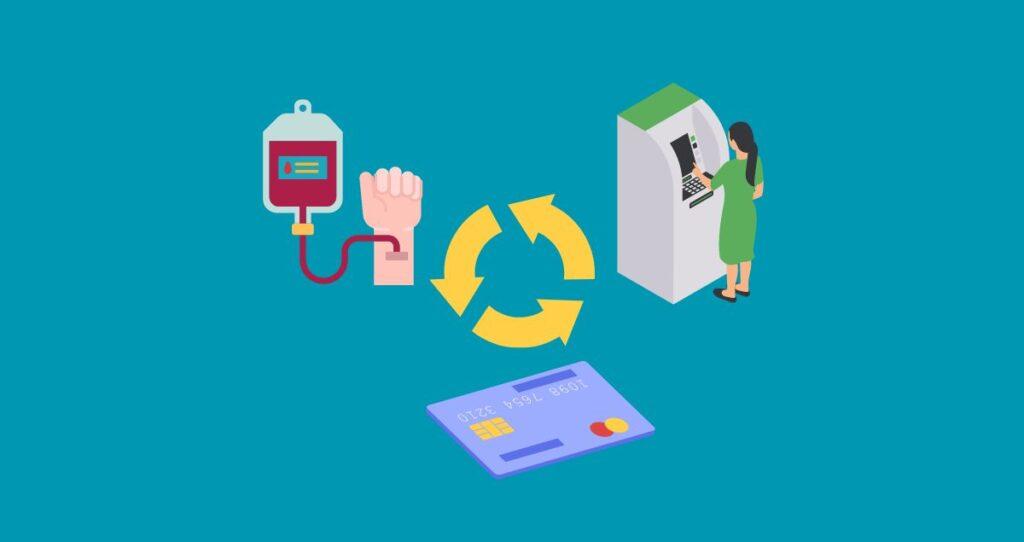Financial stress is a direct result of not having enough money or making enough money and a lack of understanding of one’s finances. Learn how you can manage your money worries and live in harmony with your finances.
Although many people associate financial stress with a lack of money, it is not always the case. There are people with enough money, and yet, they suffer from money worries. It is not about how much you have saved or how much you make. It is about understanding your finances and making financially sound decisions. Even if you make $ 1 million dollars, you will have financial worries when you desire something out of your reach.
In order to manage your financial stress, you will need a carefully crafted plan that addresses your current financial issues and future goals. No matter how much you are making or what debts you have accumulated, you can easily turn your life around and be happy just like everyone else. If not managed, financial stress can lead to serious health and mental problems.
When it comes to coping with money stress, you must be true to yourself and make a plan that addresses these issues. For example, if you are struggling with debt, you need to acknowledge how you ended up in those debts, create a complete plan on how to get out of debt, and more importantly, stay away from the specific reasons that landed you in those debts.
Here are effective strategies to manage your financial stress.
1. Identify and validate the problem
Managing financial stress requires meticulous steps and careful planning. Before you devise a plan on how to manage your financial worries, you will first need to identify the problem. This is because different financial setbacks cause diverse levels of financial anxiety, and for this reason, you will need to design a plan that meets that specific issue.
For example, a person who is struggling with $100,000 credit card debt is in a different position than someone who is worried about a flashy car they cannot afford. Both individuals have emotional struggles with money. But, one of them is definitely in a much worse position than the other. Understanding what is causing you money worries is the first step in managing those worries.
Just like the first step in curing a disease is to conduct a diagnosis, you need to know why you are having financial stress. Are you worried about not having enough money saved for retirement? Are you struggling with so much debt that you can even think about them or sleep? Once you have figured out the problems, it will be easy and much faster to come up with a plan.
Validation of the problem helps in taking the proper course of action
After figuring out the problem, you will need to validate it. It is possible that you are having financial stress for no reason. For example, most people worry about outliving their retirement savings. Although it is possible that some people outlive their retirement savings, not everyone does.
If you have enough savings, have income-generating assets that can easily cover your expenses, and put in place a retirement plan, the fear of outliving your savings might not be necessary. What you need, in this case, is an assurance that if you follow your retirement plan, everything will be alright. This is just a simple example among millions of possibilities.
What if you have accumulated too much debt and have some accounts in collections? A person in this condition should be worried about the future of his/her finances and these worries are definitely relevant. By validating the financial stress, you get to acknowledge what it is you are dealing with and its complexity. Any plan or resolution you come up with should address the specifics of the problem you identified.
You might also like:
- 6 Financial mistakes to avoid at all costs
- 10 bad habits you must stop to reach financial independence
- 16 Financial Habits that will change your life forever
2. Set up a financial goal
A life without a financial goal is like taking a walk without knowing where you are going, how far, what direction to take, and what to expect. In order words, it is like you are stranded in the middle of the ocean and have no clue on how to get back. You are just swimming aimlessly hoping that you will land at shore.
A lot of people struggle with their finances because they lack a financial goal. A financial goal comes with a sense of worth, a reason to work hard and overcome financial Anxiety, and a reason to live. Having something to live for motivates you to stay in your lane and stay optimistic as you work on it.
When you don’t have a financial goal, however, things can get complicated and your life can be miserable. You cannot save more money because you have no reason to save. So, you spend. Even if you are struggling with debt, you cannot pay off those debts and take control of your finances, unless you specifically choose a debt-free life. A financial goal becomes your ultimate goal which helps in relieving some of your financial stresses. Knowing what you want to achieve moves you from worrying about it to figuring out how to achieve it.
Many people have financial stress but they never move to the next step. Instead of establishing financial goals and a plan, they just worry about it. This keeps them in never-ending financial worries with little to no progress.
3. Leave below your means
One of the greatest financial tips that you probably heard of is to live below your means. Living below your means is the practice of knowing what you are worth and spending money on things you need rather than accumulating your wants. It is the habit of managing your finances through budgeting and planning every detail of your finances. Living below your means is the habit of being accountable for your finances and making financially sound decisions.
Many people think that living below your means is the same as eating once a day so that you can save $5. This is not true. Starving yourself leads to severe health problems and major financial instabilities. You cannot be healthy or think at an optimal level when you are malnourished.
How can living below your means help you cope with financial stress?
People who worry about their finances are usually those who don’t understand their finances. People with no financial plans and goals worry more than those who live in harmony with their finances.
Living below your means is possible only if you can follow certain financial principles. You value who you are, do not spend more than you make, choose a simple life, and more importantly, plan for your financial lifestyle. These habits alone increase your financial security and put your mind at ease. The lesser things you desire, the lower your financial stress. It is all about managing your finances and watching where every dollar is spent. Should you want to increase your expenses? You can do so with the help of your plan. You live a life full of facts rather than guesses and luck.
Related: 8 clever ways to live on a tight budget
4. Create a budget
Budgeting practices are some of the best ways to cope with financial stresses. A budget is not just a bunch of numbers listed in an Excel sheet or some budgeting app. Your budget is a complete illustration of all your income, expenses, and savings you are putting aside every month.
A budget can help you plan and save for a major purchase such as a house, car, or investment. People who experience a lot of financial stress and financial anxieties are those who never create budgets for their finances. They simply work and spend without understanding how much they are making or spending. Every month, they realize that they have nothing saved which makes it harder to plan for their futures.
Financial worries are usually associated with a lack of understanding of one’s finances. You can’t plan or save for something great because you don’t know how to save money. A quick way to turn your finances around and manage financial stress is to create a budget that allows you to reduce your expenses and increase your savings. Certainty is crucial in your daily life. The more you know and can prepare for, the letter financial stress you experience. Nothing beats a budget.
Related: What is budgeting and how does it really work?
5. Increase your income
You are probably worried about money simply because you don’t make enough of it. I know the feeling and it sucks to make a meager salary whereas your expenses are pretty much exponential. Although you can manage a small income, you are automatically limited to where you can shop, what you can eat, the car you drive, and the house you live in.
All these financial limitations become a financial burden on a daily basis. You can’t buy what you want because you don’t have the financial means to do so. It is impossible to have the wedding venue of your dream due to these financial limitations. In order words, you feel forgotten and stuck.
Having financial struggles, however, does not mean it is the end of the road. You can change your life and manage money stress by making more money. That is right. If you think there is something you want to achieve in the near future such as purchasing a house, buying a car, or simply going to college, you can achieve it by increasing your income.
The question is: Are you ready for the task ahead of you? Are you willing to do whatever it takes to conquer your financial stress and work hard for what you want and deserve? You need to find the courage within yourself and get started.
Financial stress goes lower as your income goes higher
Your financial stress will go lower as your income increases. In order words, you are worried about money because you think you cannot afford what you want to afford. Maybe you want to pay off revolving debts or pay off your mortgages.
Whatever the money worries you have, you can easily overcome them by making more money. If for example, you want to pay off your car loan fast, a simple part-time job can easily boost your monthly payments. The more you pay every month, the faster you pay off the loan, and therefore, the less worry and money anxiety you will have.
You don’t have to be rich to conquer all your fears. You just need to do whatever it takes to go from point A to point B in your finances. Do you want to pay off your student loans in 2 years? You can easily achieve it. Instead of worrying about money, sit down with your loved ones and make a financial plan together. List all your priorities, make a budget, and allocate extra funds toward your financial goals. You will be surprised by how faster you will get it done.
6. Lower your expenses
Millions of people are struggling financially due to one common behavior which is spending more than they make. That is right. When you spend more money than you make or are supposed to, you end up with little to no savings. Having no savings means that any financial setback in your life will automatically put you on the streets.
For example, a car accident can land you in a hospital and results in a very expensive medical bill. Spending too much also means you probably don’t have an emergency fund. By the time you got out of the hospital, you will owe a lot in medical bills with no resources to pay them off. When you are not fully prepared, you get hit and knocked down harder than anybody else. That is how it works.
Having no money reserve has a direct correlation with financial stress and money anxiety. Every day is like a miracle to you. You hope that nothing bad happens to you. Having no money means that you are always worried about yourself and the future of your loved ones. You cannot get ahead financially because everything is spent.
You can easily alter your financial habits by reducing how much you spend. Most people never understand that spending less than you make is the first step in building generational wealth. The formula is simple: Increase your income, spend less, invest your savings, and repeat.
You might also like: How to avoid overspending on a credit card?
7. Shop with a list
Impulse shopping is your biggest enemy if you don’t have financial discipline. For many people, it is easier to buy what they desire than to deal with the crazy regrets in their minds. People go to the market to buy one thing and come back with 10 times what they wanted to buy.
Why do many people buy a lot of stuff they don’t even need? Impulse products are to blame. Stores know that in order to increase sales, they must use every trick possible to rule you into buying. That is why you will see impulse products in aisles, by the door, etc. The more impulse products you see, the higher the chances you will buy one of them.
It is important to understand that financial stresses are directly associated with the lack of money or enough of it. The more you spend, the lesser you will save, and the more financial worries you will have. That is why you need to shop wisely and make sure that nothing interferes with your shopping list.
You can easily win spending temptations by shopping with a list. Before you go shopping, write down every product you wish to buy and buy only those products on the list. If something is not on the list, do not buy it. Also, have a budget every time you go shopping. No impulse shopping temptation will change your mind if you stick to these rules.
You might also like: 20 clever ways to reduce expenses and increase savings
8. Be happy with less
One thing that is true among consumers is that most of the things they worry about are not necessary. Yes, it does not hurt to have more. But, it hurts greatly to lose your sleep because you don’t have an expensive car, live in an expensive house, or got married in the most expensive venue. These are all materials, and therefore, you should not exhaust your mental capacities over them.
One way to manage your financial stresses and worry less about money and expensive things is to be happy with less. You don’t need all these things. Things do not create or bring happiness. If you are not happy with less, you will never be happy with more. That is why you need to first figure out a way to make peace with who you are now and your current financial situation.
You can easily build wealth, become rich, and achieve what you desire. But all these achievements start with being happy where you are first and designing a plan that improves your life. That is how you overcome financial stress and money anxiety.
9. Talk to your partner
Financial stress can hurt just like any other stress. You are probably stressed financially because you do not communicate with your partner or loved ones about money or what you are going through. Although these worries are emotional worries, it does not mean you have to handle them alone. Maybe you need a fresh eye and mind to resonate with you.
You can also talk to your friends about the financial struggles you are experiencing. They might not give you cash to cover them, but they will listen to you and probably give you advice or direct you in the right direction. You never know what is waiting for you until you ask.
You might also like:
- 9 tips on how to talk to your kids about money
- How to talk to your spouse about budgeting?
- How to talk to your spouse about money in 2022
10. Work with a financial advisor
Nobody is an expert at everything. You can be the greatest engineer ever created but fail to manage your own finances. That is how life works. Just because you are not an expert in a particular field, it does not mean you have to suffer. There is someone who is great in that field and ready to help you.
If you are struggling with money and don’t know how to turn your life around, work with a financial advisor/financial planner. These individuals are highly trained with many years of experience in the industry. You don’t have to do it alone or try to figure it out by yourself. An advisor can easily help you design a system that will help you overcome your financial stress, achieve your goals, and live in harmony with your finances.









